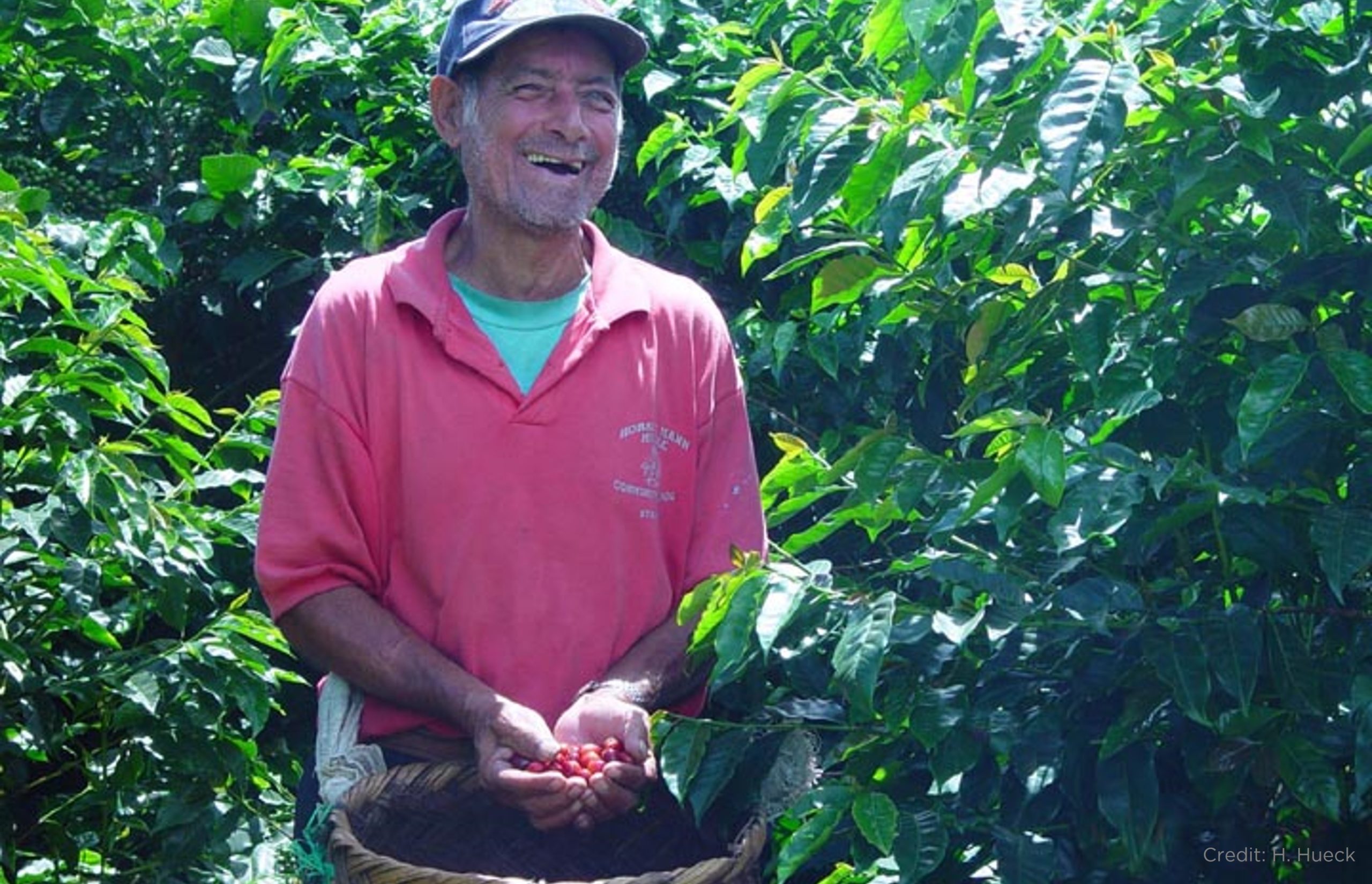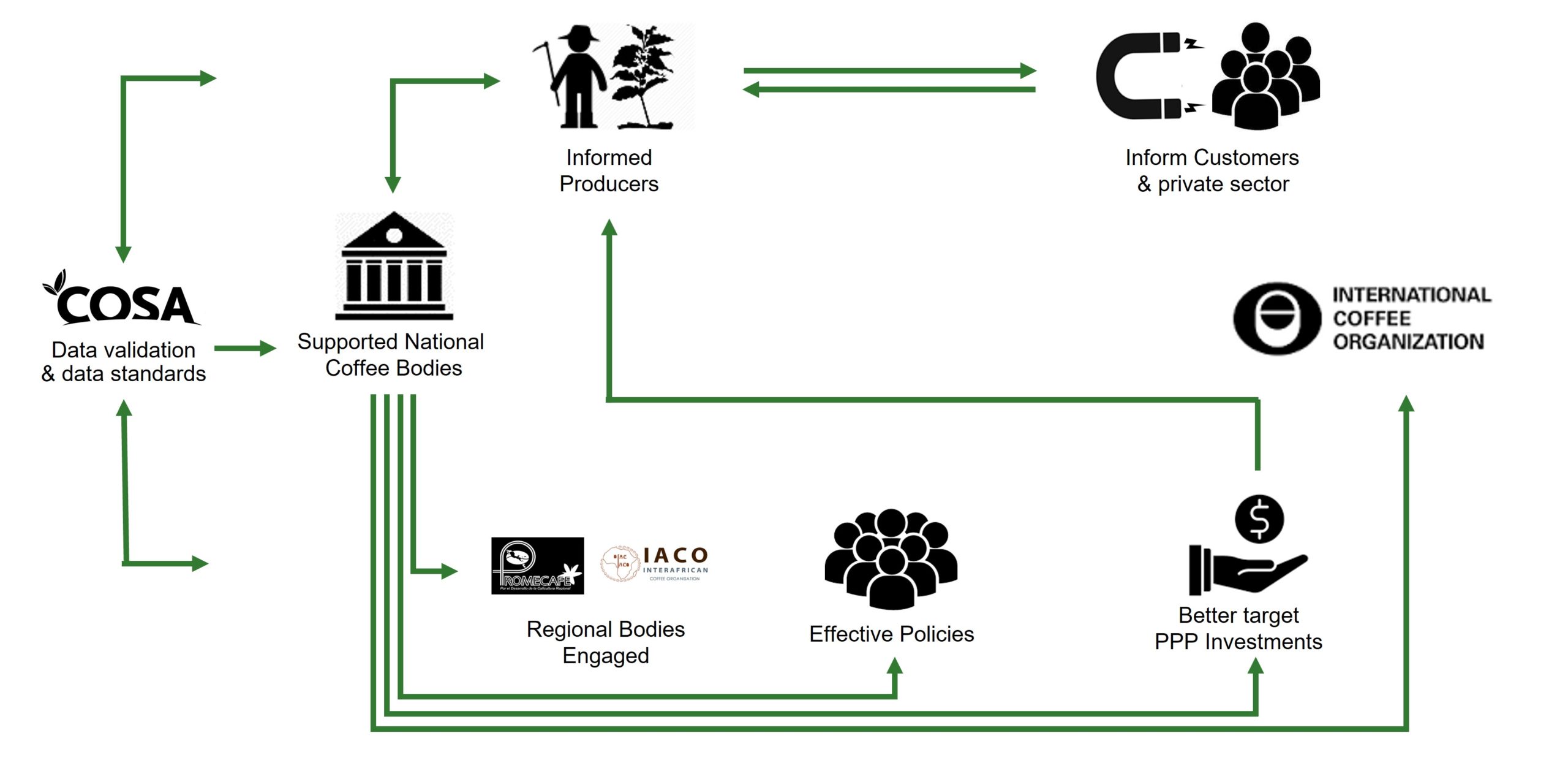
A new initiative from the International Coffee Organization (ICO) will provide, for the first time, standardized data on important factors such as farmers’ true costs of production and sectoral efficiencies in value transmission from the farm gate to the port. This is a critical step to building a shared understanding of the key elements that contribute to sustainable coffee production.
The Committee on Sustainability Assessment’s Transforming Data Initiative coordinates with a group of 50 global leaders who constitute the ICO’s Technical Work Stream (TWS) on Transparency. The mandate stems from the consensus of the Coffee Public-Private Task Force that by focusing the joint efforts of many governments, leading companies, and civil society on four work streams[1], we could better tackle some of the systemic issues that have long impeded sustainability.
On behalf of the TWS, COSA is working closely with national coffee bodies to establish a world-class data capacity that can open new levels of understanding about the financial realities of coffee-farming communities and supply chains. In partnership with a stellar International Technical Advisory Panel, we are designing universal indicators and methods that can work in any country to provide science-based data that is consistent and comparable. These will reflect prior work on data standards completed with other relevant institutions such as the FAO, the Global Coffee Platform, the InterAmerican Development Bank, and the International Women in Coffee Alliance.
With financing commissioned by the Government of the Federal Republic of Germany via GIZ, we are starting in two pilot countries: Mexico for Latin America and Rwanda for Africa.
As companies and governments require more sustainability data from supply chains, an array of data systems have emerged from traders, donors, and companies. While many focus primarily on compliance and some traceability, this farmer-centric initiative is different in five ways:
- Quality public data becomes the basis of reporting into almost any platform
- Origin institutions are in the driver’s seat, using their own world-class data
- International-level capacity is compliant with all significant international standards
- Gathering key data in one place lowers costs and is more efficient
- The data design can engage farmers, which increases data accuracy and provides direct value to farmers
Many origins cannot maintain international-caliber data systems yet the benefits can be considerable. In supporting the ICO in this endeavor to benefit the sector’s learning, COSA builds on its experience developing widely-used and standardized cross-country methods. Engaging new technologies and advanced data methods, we expect to lower the cost of data exponentially and really make it work for the entire sector.
One example is how this can be essential for the ICO’s Living and Prosperous Income Work Stream that will utilize this regular and reliable data to accurately calculate the Income gaps in ways that are credible and that can actively support the awareness and the understanding of Living Incomes.
To drive continual learning and improvement we will focus on strengthening the capacity of sectoral institutions and farmer organizations to secure and manage the data. The collaboration with national coffee institutions should facilitate improved efficiency, resilience, and value distribution. COSA support of national coffee bodies lead the work to transform data to knowledge so that it can best serve coffee farmers, their domestic institutions, and the companies that operate across the sector.
Transparency is the basis of greater sustainability, and establishing true cost accounting is considered one of six critical domains for the successful transformation of our agri-food systems[1]. Transparency can initially be perceived however as risky in terms of competition and negotiation (“Green Coffee Pricing Transparency Is Critical (And Complicated)”, Perfect Daily Grind, 4/19/2018). Yet, this is incorrect. Most savvy traders already have a sense of key data such as costs of production putting them at an advantage with farmers that are poorly informed. In such cases, and especially with smaller farmers, transparency can serve to level the playing field and can allow more equitable negotiations.
Good data flows create optimal value

Transparency is thus a public good. Individuals, communities, and businesses all need access to valuable information and policymakers must be well informed. Sectoral organizations and policymakers can then better target investments to improve production costs and increase efficiencies across the sector. Together, such interventions could improve farmer livelihoods in a lasting manner.
Read more like this: Advancing Transparency in the coffee sector.
[1] Living and Prosperous Income, Transparency, Policy, and Resilient Landscapes.
[2] Transforming food systems: the missing pieces needed to make them work, Journal article, Published 10th December 2020 by Oxford University Press and American Society for Nutrition. Authored by Kennedy, E. , Webb, P., Block, S., Griffin, T., Mozaffarian, D. and Kyte, R.






Leave A Comment